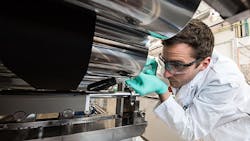CECIMO, the European Assn. of the Machine Tool Industries, joined 22 other EU trade associations in declaring support for increased commitment to industrial research and “innovation,” as outlined in the EU’s Research & Innovation Framework Programme (FP9.) Together, the groups issued a statement to the European Union and European Commission that pledges their support for a new, expansive approach to new research and applied technologies.
Specifically, the signatories call for increasing significantly the overall EU budget for research and innovation, and allocating funds equally to a) basic research, b) applied research, and c) close-to-market efforts (e.g., pilot programs, prototypes.)
CECIMO is a Brussels-based union of trade associations for over 1,500 companies across the European Union, companies who are responsible for 97% of machine tool production in the 28-nation region.
In recent years, the group has consistently emphasized the need for region’s public and private authorities to define and support a competitive industrial strategy, including financial incentives; argued for accelerating commercial industrialization of emerging technologies, like additive manufacturing; argued for public support to train individuals in skills for new manufacturing technologies.
The EU’s Framework Programmes for Research and Technological Development, designated as FP1 through FP8 (the latter, and current program is titled "Horizon 2020") are funding programs created by the European Union together with the European Commission to support and foster research in the European Research Area – a system of system of scientific research programs integrating resources from across the 28-nation region.
Last fall, the EU initiated planning for the next Framework Programme, i.e., FP9. Reportedly, the planning is considering two possible approaches: the more ambitious one sees Europe and its research and innovation investment as a global agent of change in climate and energy policy, urbanization, digital healthcare and disease prevention, and security and resilience. The alternative approach would focus on pursuing current trends and “intensifying” strategies for dealing with existing challenges.
The current program, Horizon 2020, is the largest EU R&D program ever. It will consume nearly €80 billion ($90 billion) over seven years (2014-2020), notwithstanding any private investment that this funding will attract, to advance technological ideas from labs to market.
Even so, the signatories now stress that more “massive” investments in research and innovation, particularly in applied research, is necessary for the region to remain globally competitive. “Despite many efforts, the EU (2.0%) is still lagging behind countries like Japan (3.6%) or the U.S. (2.7%) in terms of R&D expenditures as a percentage of GDP, and China is catching up rapidly,” according to the statement issued by CECIMO.
“With the highest share of R&D spending coming from the business sector, which accounts for 65% of all R&D spending in the EU, it is extremely important to significantly increase public spending both at EU and national levels, and support the global competitiveness of European industries.”
The signatories offered to strengthen its cooperation with the European Commission, the European Parliament, and the Council of the European Union, “to define and implement an ambitious FP9 with a strong focus on EU industrial leadership aiming at positioning Europe as a global industrial leader and safeguarding our growth and jobs.”
About the Author
Robert Brooks
Content Director
Robert Brooks has been a business-to-business reporter, writer, editor, and columnist for more than 20 years, specializing in the primary metal and basic manufacturing industries.
